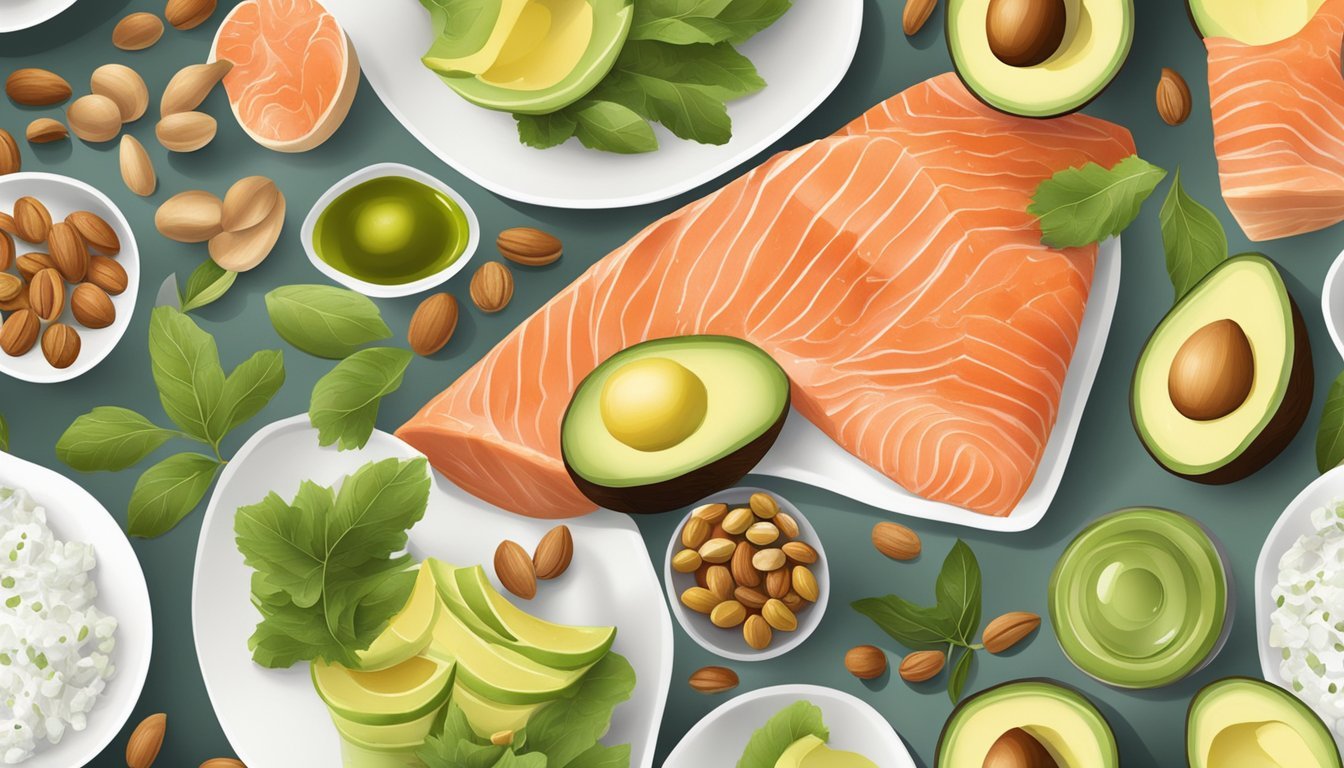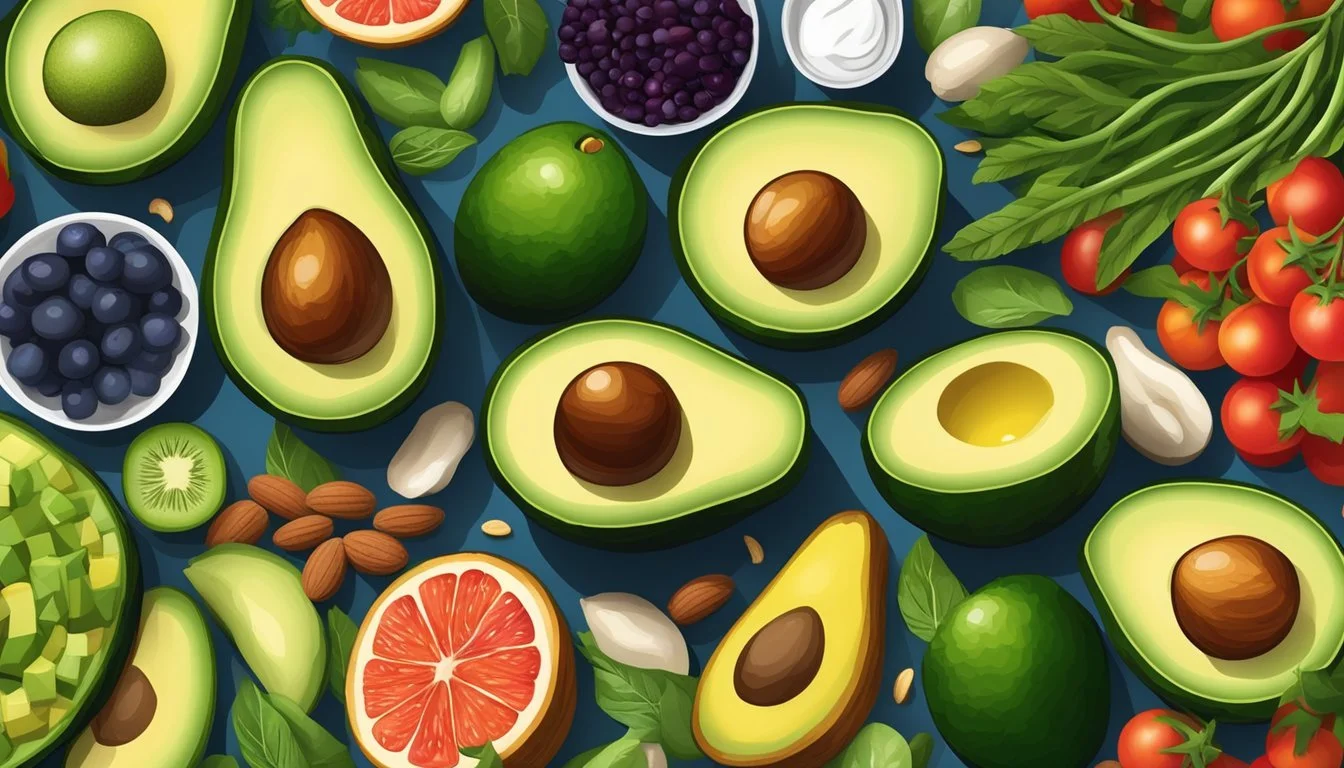7 Heart-Healthy Foods That Boost HDL Cholesterol
Top Choices for Boosting Good Cholesterol
Maintaining a balanced diet is key to managing cholesterol levels and supporting heart health. Foods high in HDL, often referred to as "good" cholesterol, play a vital role in this process. By incorporating certain nutrient-rich foods, individuals can effectively boost their HDL levels and potentially reduce the risk of cardiovascular diseases.
Understanding which foods can elevate HDL cholesterol levels empowers individuals to make healthier dietary choices. A diet rich in these beneficial foods contributes significantly to overall well-being and cardiovascular health.
1) Salmon
Salmon is a highly nutritious fish known for its ability to boost high-density lipoprotein (HDL) cholesterol levels. HDL cholesterol is often referred to as "good" cholesterol because it helps remove low-density lipoprotein (LDL) cholesterol from the bloodstream.
Rich in omega-3 fatty acids, salmon can support cardiovascular health. These healthy fats contribute to increased HDL levels, which may lower the risk of heart disease.
In addition to omega-3s, salmon provides essential nutrients such as protein, vitamins, and minerals. Regular consumption of salmon can offer a range of health benefits, including improved cholesterol profiles.
Including salmon in the diet can be an effective way to promote higher levels of HDL cholesterol. It can be grilled, baked, or cooked in various other ways to suit different tastes.
2) Mackerel
Mackerel stands out as a robust choice for increasing HDL cholesterol levels. It is rich in omega-3 fatty acids, vital for heart health. Each serving contains 2670 mg of omega-3 per 100 grams. This high concentration makes mackerel one of the best sources among oily fish.
Mackerel also provides essential nutrients beyond omega-3. A single serving offers 8.71 µg of vitamin B-12, surpassing the daily recommended allowance. Other nutrients include niacin, iron, vitamin B6, riboflavin, magnesium, phosphorus, folate, and selenium.
Its affordability and nutrient density make mackerel an accessible choice for many. Regular consumption can deliver significant health benefits, especially concerning heart health.
For those seeking heart-healthy food options, mackerel integrates well into various diets. It's beneficial not just for boosting HDL cholesterol, but for providing a well-rounded nutrient profile.
3) Sardines
Sardines are an excellent source of nutrients that can positively impact cholesterol levels. Packed with omega-3 fatty acids, sardines help reduce blood triglycerides and may boost levels of high-density lipoprotein (HDL), often referred to as the "good" cholesterol.
Regular consumption of sardines can contribute to maintaining cardiovascular health. The American Heart Association supports including fish like sardines in your diet for their heart-protective properties.
These small fish are also rich in proteins, vitamins, and minerals. A single 3.75-ounce can of sardines provides substantial amounts of essential nutrients, making them a nutritious choice for those looking to improve their cholesterol profile.
4) Rainbow Trout
Rainbow trout is an exceptional fish rich in essential nutrients, making it a valuable addition to a diet aimed at improving HDL cholesterol levels.
This oily fish is packed with omega-3 fatty acids, which are known to enhance HDL cholesterol. Regular incorporation of rainbow trout in meals can support cardiovascular health.
Additionally, rainbow trout is a low-calorie source of high-quality protein.
A 3-ounce serving provides significant amounts of calcium, potassium, magnesium, and niacin.
It also delivers essential vitamins, including vitamin B12 and vitamin D, contributing to overall metabolic functions and maintaining bone health.
Including rainbow trout in a balanced diet can help harness its nutritional benefits while supporting healthy cholesterol levels.
5) Herring
Herring is a fatty fish that stands out for its healthy nutrient profile. It is rich in omega-3 fatty acids, which are known to help raise HDL (good) cholesterol levels in the blood.
This fish provides a good source of protein and essential nutrients. Omega-3 fatty acids in herring contribute to cardiovascular health, making it a beneficial addition to the diet.
Consuming herring can also reduce inflammation and support overall heart health. This fish is versatile in the kitchen, suitable for grilling, baking, or pickling.
Including herring in meals several times a week can positively impact cholesterol levels. Its unique combination of nutrients makes it a valuable food for those looking to boost their HDL cholesterol.
6) Atlantic Cod
Atlantic Cod stands out as a nutritious option for those seeking to increase their HDL cholesterol levels. This fish is notable for its high protein content and low levels of calories, fat, and carbohydrates.
One of the key nutritional benefits of Atlantic Cod is its minimal fat content. A 4-ounce serving contains just about 0.5 grams of fat.
Despite its low fat, Atlantic Cod provides essential omega-3 fatty acids such as DHA and EPA, which are linked to cardiovascular benefits. These omega-3s support heart health, although cod contains lower amounts compared to fattier fish.
The polyunsaturated fats found in Atlantic Cod also contribute to its heart-healthy profile. Regular consumption can be part of a balanced diet aimed at improving HDL cholesterol levels. Atlantic Cod can be eaten grilled, baked, or steamed, offering versatility in meal preparation.
7) Chia Seeds
Chia seeds are small but packed with nutrients, making them a popular addition to many diets.
These seeds contain a high amount of alpha-linolenic acid (ALA), an omega-3 fatty acid. ALA has exhibited the ability to positively impact lipid profiles, which includes raising high-density lipoprotein (HDL) cholesterol.
Some studies on chia seeds suggest that their consumption may lead to improved HDL levels. Others indicate that while significant changes in HDL may not always occur, chia seeds can still benefit overall heart health.
In addition to their omega-3 content, chia seeds are rich in fiber and antioxidants. These components contribute to their heart-healthy reputation. However, results from various studies have been mixed.
Despite the varying outcomes, chia seeds remain a nutritious option known for their potential to support healthy cholesterol levels and overall cardiovascular health.
8) Flaxseeds
Flaxseeds are among the richest sources of omega-3 fatty acids, particularly alpha-linolenic acid (ALA). These nutrients are crucial for heart health.
Cardiologists and dietitians recommend incorporating flaxseeds into a balanced diet.
Studies have indicated that supplementation with flaxseeds can increase HDL cholesterol levels. For those aiming to raise their HDL cholesterol, flaxseeds offer a nutritious option.
Flaxseeds also contain fiber, which can help reduce LDL cholesterol levels. The combination of fiber and omega-3 fatty acids makes flaxseeds beneficial for cardiovascular health.
Incorporating flaxseeds into meals is straightforward. They can be added to smoothies, sprinkled on salads, or mixed into baked goods.
Ground flaxseeds are particularly versatile and may offer more benefits as they are easier for the body to digest.
When consuming flaxseeds, it's essential to store them properly. Keeping them in an airtight container in the refrigerator can help maintain their freshness and nutritional value.
9) Walnuts
Walnuts are known for their impressive nutritional profile. They are a rich source of polyunsaturated fats, particularly alpha-linolenic acid (ALA), which is an omega-3 fatty acid.
Consuming walnuts can positively influence cholesterol levels. Studies indicate that walnuts help raise high-density lipoprotein (HDL), the "good" cholesterol. This improvement in HDL can assist in promoting better heart health.
Walnuts also contain significant amounts of fiber and antioxidants. These compounds contribute to reducing low-density lipoprotein (LDL), also known as "bad" cholesterol, further supporting cardiovascular health.
Regularly adding walnuts to one's diet may lead to various health benefits. They can be consumed as snacks or added to dishes like salads and oatmeal for a nutrient boost.
Their versatility and health benefits make walnuts a valuable addition to any balanced diet, especially for those looking to manage cholesterol levels effectively.
10) Almonds
Almonds are a nutritious snack that can play a significant role in boosting HDL cholesterol. Being rich in monounsaturated fats, they help to improve heart health by increasing the levels of good cholesterol.
Consuming almonds regularly can also reduce LDL cholesterol. This is due to their high content of healthy fats and fiber, which aid in lowering bad cholesterol levels in the blood.
Additionally, almonds provide a good source of vitamin E, magnesium, and antioxidants. These nutrients further support cardiovascular health and overall well-being.
Including a handful of almonds in your daily diet is a simple yet effective way to enhance your HDL cholesterol levels and promote heart health effectively.
Understanding HDL Cholesterol
HDL, or high-density lipoprotein, cholesterol is often referred to as "good" cholesterol because of its beneficial role in heart health. It helps remove excess cholesterol from the bloodstream, reducing the risk of heart disease and stroke.
Role Of HDL In The Body
HDL cholesterol is essential in transporting cholesterol from other parts of the body back to the liver. Once in the liver, the cholesterol is either recycled or excreted from the body. This process helps keep the arteries clear, reducing the likelihood of plaque buildup.
HDL acts as a maintenance crew, cleaning up excess cholesterol that can block arteries and cause cardiovascular issues. Without sufficient HDL, LDL (low-density lipoprotein) cholesterol accumulates, leading to heart-related complications.
Benefits Of High HDL Levels
High levels of HDL cholesterol are linked to a lower risk of heart disease and stroke. This type of cholesterol helps prevent the development of atherosclerosis, a condition where arteries become narrowed and hardened due to plaque buildup.
Maintaining high HDL levels can also improve overall cardiovascular function. For example, HDL enhances the removal of cholesterol from arterial walls, thereby promoting better blood flow. Additionally, higher HDL levels may have anti-inflammatory and antioxidant effects, contributing to heart health.
Dietary Habits To Boost HDL
Certain dietary habits can significantly boost HDL cholesterol levels, contributing to better heart health.
Healthy Fats
Consuming healthy fats like those found in olive oil, avocados, and nuts can improve HDL cholesterol.
Olive oil
Avocados
Nuts (especially almonds and walnuts)
Whole Grains
Whole grains such as oats and brown rice are rich in fiber, which can help increase HDL levels.
Fatty Fish
Fatty fish like salmon, mackerel, and tuna are excellent sources of omega-3 fatty acids, beneficial for raising HDL cholesterol.
Fruits and Vegetables
Including antioxidant-rich fruits and vegetables is key. Foods like berries, spinach, and kale support overall cardiovascular health and boost HDL.
Legumes
Legumes such as beans, lentils, and peas are high in fiber and help increase HDL cholesterol.
Specific Nutrients
Incorporate foods rich in niacin (vitamin B3) such as chicken, turkey, and mushrooms to help raise HDL levels.
High-Fiber Foods
Increasing the intake of high-fiber foods like oatmeal and barley helps improve the HDL to LDL ratio.
Adopting these dietary habits offers a natural way to enhance HDL cholesterol, contributing to a healthier heart.
Other Factors Influencing HDL
Lifestyle habits and regular physical activity play significant roles in maintaining and increasing HDL cholesterol levels. Understanding how everyday choices impact HDL can empower individuals to make better health decisions.
Lifestyle Changes
Dietary choices have a prominent impact. Avoiding trans fats is crucial since they can decrease HDL and increase LDL levels. Foods often high in trans fats include some margarines, shortening-based products, and many fried foods.
Saturated fats found in meats and full-fat dairy products should also be limited. Instead, choose fats like olive oil, which is known to support higher HDL levels.
Alcohol consumption in moderation can also positively influence HDL levels. Moderate drinking, defined as up to one drink per day for women and two for men, has been associated with raised HDL cholesterol. However, excessive alcohol intake can lead to health issues, so it's essential to strike the right balance.
Exercise And HDL Levels
Exercise has a profound effect on raising HDL cholesterol. Regular physical activity, such as brisk walking, running, and cycling, can significantly improve HDL levels. Researchers have found that aerobic exercises are particularly beneficial for boosting HDL.
It’s recommended to aim for at least 30 minutes of aerobic exercise most days of the week. Consistent exercise not only helps in maintaining a healthy weight but also increases HDL’s efficiency in removing LDL cholesterol from the bloodstream.
Strength training exercises twice a week can further support cardiovascular health and HDL levels. Incorporating a variety of physical activities ensures that all aspects of health are addressed, contributing to better cholesterol management.








